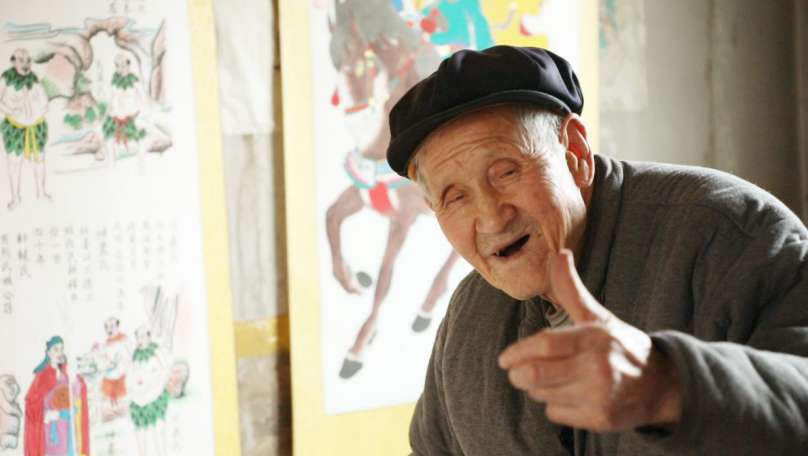

Many Chinese put up colorful woodblock paintings in their homes as holiday decorations during the Chinese Lunar New Year. These pictures often depict abundance and feature chubby children, representing people's longing for a better life.
There are three major woodblock New Year painting styles in China: Tianjin’s Yangliuqing, Suzhou’s Taohuawu, and Yangjiabu New Year paintings, which emerged in the Ming Dynasty (1368-1644) around 600 years ago.
In 2006, Yangjiabu New Year paintings were listed in the first batch of national intangible cultural heritages by China's State Council.
Many artists have devoted their entire lives to this traditional folk art in Yangjiabu, and Yang Luoshu is one of the most famous.

Yang Luoshu, 94, is a representative national inheritor of woodblock New Year paintings. Woodblock paintings have been in his family for generations, so he learned the art unconsciously just by growing up in this particular community.
Yang began studying New Year's paintings with his father when he was just 16 years old, and has been working in this industry for 79 years.
Making New Year's pictures involves five steps: sketching the outline, engraving the woodblock, printing, painting and mounting, all of which are done by hand.
"The most difficult part of making woodblock New Year's paintings is engraving. It takes about two months to carve a Door God, which is especially tricky, because of all the armor and vivid facial expressions,” said Yang.
The old artisan believes that although modern printing techniques have improved efficiency, nothing can compare to the traditional craft and spirit of woodblock paintings. Although his knuckles have become severely deformed after decades of wielding his knife, he still insists on carving the woodblock by hand.
As the 19th generation inheritor of the Tongshunde art shop, Yang Luoshu is well aware of his responsibility. The old man said firmly, "I have thousands of woodblocks and inherited this craftsmanship from the older generation. I cannot let the New Year art disappear. I must pass it on!"
"I not only teach my children, but also have many apprentices from across China, and even from abroad," Yang said, "My Japanese apprentice Yoko Ishikawa recently wrote a letter to me. She writes to me almost every year."
But Yang realizes that there has to be innovation to ensure that handmade New Year paintings live on.
Driven by this desire to innovate, he decided to carve the four great classical novels of Chinese literature (Romance of the Three Kingdoms, Water Margin, Dream of the Red Chamber and Journey to the West,) into paintings, and spent five years on these works with his children.
Yang puts all his efforts into making Yangjiabu New Year woodblock paintings, and tries to sell them not just all over China, but also around the world. His paintings are now widely popular in many foreign countries, such as the United States, Singapore and Japan.
Yang Luoshu was named a "master of folk arts" by UNESCO in 2001, the highest honor for woodblock artists.
The Yangjiabu Folk Art Grand View Garden was established in July 1989, and has taken the lead in promoting the development of local culture and tourism.

Many artists come to the Grand View Garden to create New Year woodblock paintings every day.
"Yangjiabu New Year woodblock paintings emerged in the Ming Dynasty, and still have a significant impact in the world," said by Wei Kuanxi, who is an artistic consultant at the Yangjiabu Folk Art Grand View Garden.
The Yangjiabu Grand View Garden has more than 1 million visitors a year, including roughly 8,000 foreigners from Russia, Japan and other neighbouring countries.
"New year paintings are detailed and very colorful," said one visitor who comes from Denmark.
Another tourist from New Zealand said, “A wonderful, brightly colored man with a fish on the woodblock paintings. This means that next year, I am hopefully going to have lots of money."
In order to better pass on and promote Yangjiabu New Year Paintings, the Grand View Garden also launched a study tour project for primary school students. Over 60,000 students came for study tours in 2019.

Liu Jian, who is the director of the Intangible Cultural Heritage Protection Center of Hanting District, Weifang City said, "Today, Yangjiabu has more than 30 inheritors who create woodblock New Year paintings, and about 300 local people have jobs related to Yangjiabu New Year woodblock paintings."
More than 20 million New Year woodblock paintings are printed every year, reaching a value of 100 million yuan.
"We will further promote the protection and development of Yangjiabu New Year woodblock paintings, so our outstanding intangible cultural heritage can go out to the world," said Liu Jian.

 Award-winning photos show poverty reduction achievements in NE China's Jilin province
Award-winning photos show poverty reduction achievements in NE China's Jilin province People dance to greet advent of New Year in Ameiqituo Town, Guizhou
People dance to greet advent of New Year in Ameiqituo Town, Guizhou Fire brigade in Shanghai holds group wedding
Fire brigade in Shanghai holds group wedding Tourists enjoy ice sculptures in Datan Town, north China
Tourists enjoy ice sculptures in Datan Town, north China Sunset scenery of Dayan Pagoda in Xi'an
Sunset scenery of Dayan Pagoda in Xi'an Tourists have fun at scenic spot in Nanlong Town, NW China
Tourists have fun at scenic spot in Nanlong Town, NW China Harbin attracts tourists by making best use of ice in winter
Harbin attracts tourists by making best use of ice in winter In pics: FIS Alpine Ski Women's World Cup Slalom
In pics: FIS Alpine Ski Women's World Cup Slalom Black-necked cranes rest at reservoir in Lhunzhub County, Lhasa
Black-necked cranes rest at reservoir in Lhunzhub County, Lhasa China's FAST telescope will be available to foreign scientists in April
China's FAST telescope will be available to foreign scientists in April